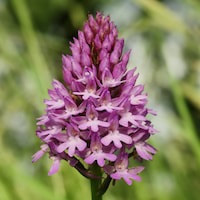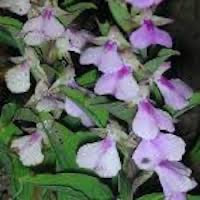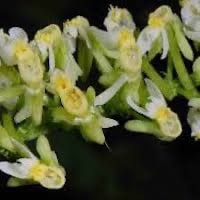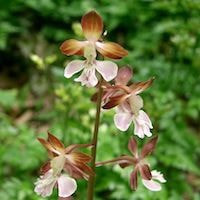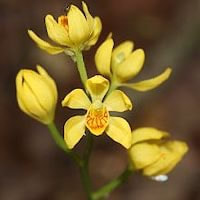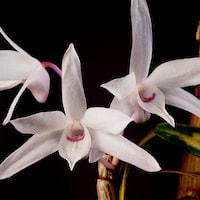MOR8- Men's Oriental 8 - Spice Things Up
|
Native Singaporean Orchid notes: Lycaste Imschootiana
Lycaste imschootiana, a natural orchid hybrid, is prized for its enchanting fragrance and exotic beauty. Belonging to the Orchidaceae family, it was discovered in 1893 and features stunning blooms with intricate patterns and colors. This orchid thrives in diffused light and well-draining orchid bark mix. Its spicy and exotic scent makes it ideal for perfumery, where orchid fragrances are valued as base or heart notes. Used in Oriental 8 (Men) for team-building perfume workshops, Lycaste imschootiana enriches the experience with its unique aroma, showcasing its role in creating sophisticated and memorable perfumes.
|
Therapeutic Orchid notes:
|
Anacamptis Rich
Anacamptis is a genus of orchids named for the Greek word "anakamptein," meaning "to bend back." With about twelve species, these orchids thrive in grasslands across northern Iran, the Middle East, and southern and central Europe. They feature unique floral structures that attract bees, butterflies, and moths for pollination. Historically, Anacamptis tubers were used to make salep, a beverage once cherished for its supposed health benefits and as an aphrodisiac. Overharvesting for salep has endangered some species, prompting conservation efforts to safeguard these culturally significant orchids. |
|
Brachycorythis obcordata
Brachycorythis obcordata, known as "Heart shaped Brachycorythis," is an orchid species found across Asia, including India, Bhutan, Bangladesh, and Myanmar. It blooms from June to September, depending on the region. The plant's roots are used in traditional medicine for treating diarrhea and respiratory issues, and as a tonic in Nepal. Interestingly, its pseudobulbs are cooked and eaten as food. Conservation efforts are crucial due to habitat loss and over-collection for medicinal and horticultural purposes. Initiatives focus on protecting habitats, promoting sustainable practices, and raising awareness to safeguard these orchids for future generations. |
|
Calanthe davidii Franch.
Calanthe davidii Franch., also known as the "sword leaf prawn spine orchid" or "Changyegenjie Lan" in Chinese, is an orchid species found across India, southern China, Taiwan, and southern Japan. Its flowers are densely crowded and display intricate structures typical of orchids. Known as "Mayaqi" in traditional Chinese Herbal Medicine, it shares this name with Calanthe alpina. Conservation concerns arise from habitat loss and over-collection, particularly in the Himalayas, where it may be extinct. Conservation efforts focus on protecting remaining habitats and promoting sustainable practices to preserve this valuable orchid species. |
|
Calanthe discolor Lindl.
Calanthe discolor Lindl., known as the "prawn spine orchid" or "Xiaji Lan" in Chinese, is prized in traditional Chinese medicine for its medicinal properties. It contains compounds like calanthoside and glucoindican, known for improving skin blood flow and promoting hair growth. Used widely in Huadong, China, its roots and stems treat abscesses, rheumatism, and skin ulcers. Despite its cultural significance, further research is needed to validate its efficacy scientifically. Conservation is crucial due to habitat loss and overharvesting for medicinal use. |
|
Cephalanthera falcata Lindl.
Cephalanthera falcata Lindl., known as the "gold orchid" or "Jin Lan" in Chinese, is valued in traditional Chinese medicine for its medicinal benefits. Found in regions across China, including Hubei and Sichuan, the entire plant is used to treat fever and conditions associated with heat, like sore throats and toothaches. Its cooling properties are cherished in herbal remedies, though more scientific research is needed to fully understand its effectiveness and safety. Consulting with healthcare professionals is advised before using Cephalanthera falcata or any herbal remedy to ensure proper use and safety considerations. |
|
Dendrobium moniliforme (L.) Sw. syn. Dendrobium candidum Wallich ex Lindl., Dendrobium wilsonii Rolfe
Dendrobium moniliforme, known as "Shihu" (Noble Orchid) in Chinese, is highly esteemed for its cultural and medicinal significance across Asia. It is cherished for its ornamental beauty in Japan and is cultivated widely for its delicate flowers. In traditional medicine, the pseudobulb of Dendrobium moniliforme is used to alleviate conditions like body heat, haemoptysis, thirst, and weakness. Scientific studies have identified compounds like denbinobin and moniliformedequinone, showing potential antitumor and antiviral activities. While its medicinal uses are deeply rooted in Asian culture, further research is needed to fully understand its therapeutic benefits and ensure safe usage in modern medicine. Consulting healthcare professionals is advised before incorporating Dendrobium moniliforme into any treatment regimen. |
Other scent note
Blend of several spicy notes especially clove and black pepper with dash of orange
Scentopia Library Reference ingredient
Musk - Check details at Scentopia's scent library
Download the guided mediation that works best with this Orchid fragrance oil
| men_oriental_essential_oil_orchi_00008.mp3 | |
| File Size: | 113102 kb |
| File Type: | mp3 |

